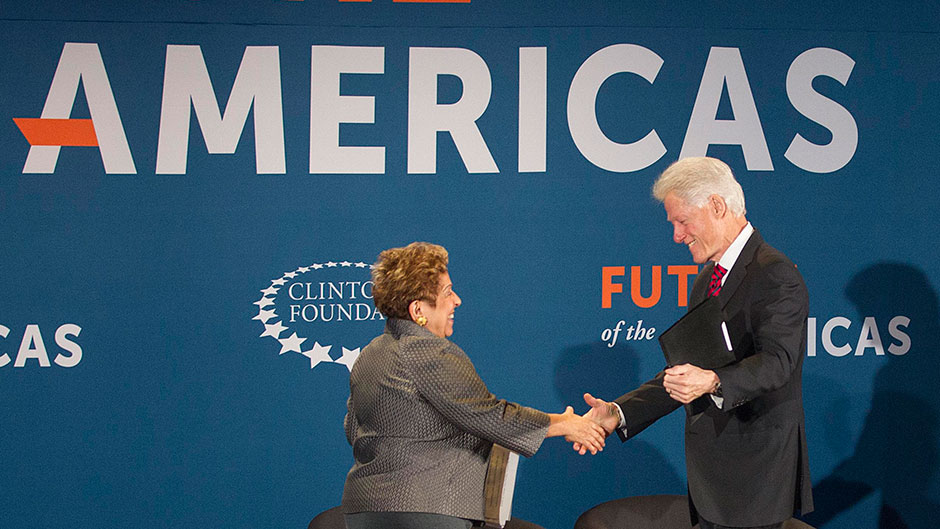Twenty years ago, University of Miami President Donna E. Shalala was a cabinet member in Bill Clinton’s administration when the then-U.S. president convened leaders from 34 democracies in the Western Hemisphere for the first Summit of the Americas in Miami, a conference that provided them with a forum to establish an agenda for trade and social issues and to articulate a vision for their future.
On Thursday, Shalala, who was U.S. secretary of health and human services for two terms in the Clinton administration, helped her former boss unveil another historic conference, welcoming a roster of international leaders from across Latin America, the Caribbean, Canada, and the United States, as the Clinton Foundation’s Future of the Americas got underway on the University of Miami’s Coral Gables campus.
“Miami isn’t only an American city—it’s an Americas city, and today <i>Miami es el mundo</i>,” Shalala said, the latter portion of her remark being a reference to her “Miami Is the World” address given 13 years ago at her inauguration as UM president.
The one-time Future of the Americas conference, which President Clinton said is intended to “complement, not complicate” the upcoming Summit of the Americas next April, was convened to start a dialogue about what has occurred in the region over the past two decades and to assess what will happen in the next 20 years, with a focus on how to strengthen investment, jobs, health care, and education.
<img src="http://www6.miami.edu/communications/expression_images/news_story_images/Future-of-the-Americas-2.jpg" width="350px" align="left" alt=“Clinton, Calderon, Fonseca, and Slim”>
<em>From left, President Bill Clinton; President of Colombia Juan Manuel Santos Calderón; Susan Fonseca, founder and CEO of Women@TheFrontier and a founding member of Singularity University; and Mexican business magnate, investor, and philanthropist Carlos Slim discuss what the future holds for the Americas.</em>
In her welcoming statement, Shalala highlighted many of the Americas’ strengths, describing it as a region rich in culture and commerce and brimming with biodiversity and other precious resources. She said leaders in business, government, health care, and education “have an opportunity to protect these gifts and to ensure a healthy and prosperous future for the people of our region.”
But such a task, she warned, requires collaboration. “By working together, we will have a lasting impact that reaches far beyond this room and even this hemisphere,” said Shalala, speaking from the Student Activities Center’s third-floor Grand Ballroom.
Shalala, who in September announced that she is stepping down as UM president at the end of the 2014-15 academic year, explained that the Clinton Administration invested billions of dollars in Latin America’s economy, providing crucial support in loans, trade, and the fight against poverty, drugs, and crime.
“But it didn’t stop there,” she said. “President Clinton’s ongoing efforts through the Clinton Foundation, the Clinton Global Initiative, and now the Future of the Americas continue to forge lasting bonds of friendship, of mutual respect, and common purpose among our nations. As President Clinton has shown, we in the U.S. can learn a great deal from our neighbors in the hemisphere. We are a family—not just of proximity and convenience, but of shared needs and universal benefits.”
Since the first Summit of the Americas two decades ago, Clinton said the hemisphere has thrived in many areas, from rising per capita incomes and falling infant mortality rates to better health care.
“We also all know where our hopes were not fulfilled,” Clinton said. “We know now that this climate change problem is much more severe than we had originally thought 20 years ago, and that it is bearing down on us more rapidly than we had thought.” He specifically mentioned how island nations and large coastal cities on the Atlantic side of Latin America are exceedingly vulnerable to rising sea levels, and that the changing composition of the ocean “could undermine the ability of as many as a billion people to get their primary source of protein from fish.”
Clinton urged leaders to look forward to the next 20 years and to ask themselves what they could do to move the region in a more positive direction. As an example, he pointed out that women make up 30 percent of the attendees at the conference—far more than attended the 1994 Summit of the Americas. “The bad news is it should be more,” he said.
Clinton then moderated an opening panel in which three prominent leaders commented on what they believe needs to be done in the next 20 years to facilitate further change in the Americas. Juan Manuel Santos Calderón, the president of Colombia who previously visited UM in late 2013; Susan Fonseca, founder and CEO of Women@TheFrontier and a founding member of Singularity University, a Silicon Valley-based teaching organization dedicated to applying technologies to address global challenges; and Carlos Slim, a Mexican business magnate, investor, and philanthropist who is chairman of the global conglomerate Grupo Carso, all agreed that more cooperation among nations is needed.
“Problems don’t stop at the border,” Fonseca said. “It’s about all of us talking together.”
While opening and closing remarks were open to the media, breakout sessions were closed in a move to foster problem-solving dialogue. Those closed meetings were set to address topics such as alleviating the burden of chronic diseases across the Americas, enhancing the capacity of Latin American and Caribbean nations to generate clean energy, encouraging entrepreneurship in Latin America among women, reducing malnutrition and rising obesity rates among children in the Americas, increasing agricultural productivity, and improving access to high-quality education.
The Future of the Americas conference comes three months before UM will host the eighth Clinton Global Initiative University, which will bring together more than 1,000 student leaders to make Commitments to Action in five focus areas: Education, Environment and Climate Change, Peace and Human Rights, Poverty Alleviation, and Public Health.

